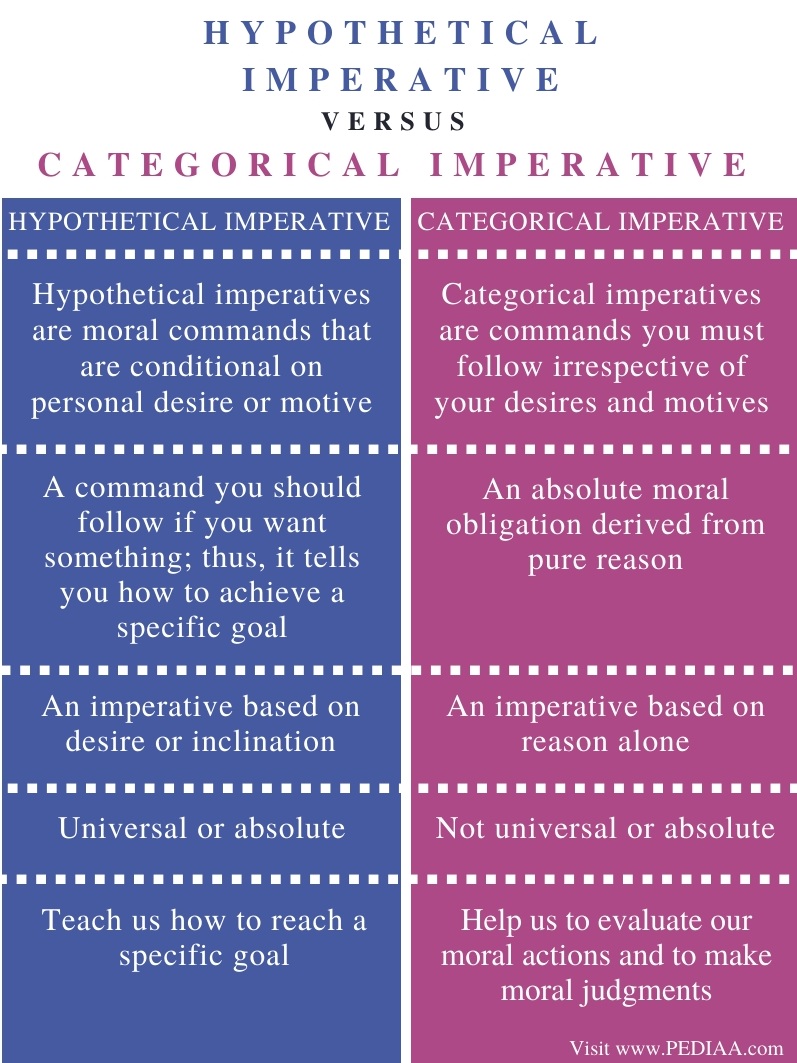Explain the Differences Between the Hypothetical and Categorical Imperatives
An hypothetical imperative comes to exist as a suggested absolute imperious imperative that necessarily should be but is not. If you want A than do B Categorical Imperative is a moral imperative that is unqualified and does not depend on ones desires.

What Is The Difference Between Hypothetical And Categorical Imperative Pediaa Com
Hypothetical is the non-moral principle that takes the form.

. Q3 What does Mill identify as the natural basis of sentiment for utilitarian morality. Q2 What is Summum Bonum or highest good according to Mill. A categorical imperative exists as an absolutely necessary Imperious imperative that must be.
The main difference between them is that the Categorical Imperative is moral and the Hypothetical Imperative is not thus in order to do your moral duty you must follow the Categorical Imperative. Hypothetical imperatives unlike categorical imperatives lets you know you what you need to achieve in order to attain a specific goal. We review their content and use your feedback to keep the quality high.
For instance if one would like to possess nice things then one must get a job if one wishes not to be confined to prison then one must not steal things that do not belong to them. The categorical imperative simply implies that you should do X no matter what the circumstances are and no matter what the outcome will be. While hypothetical imperatives are conditional categorical imperatives are not.
It focuses on the consequences of an action whilst the categorical imperative is firmly deontological. The basic difference between these two is that categorical describes a kind of obligation that one has to do no matter what. If we want to enjoy good health we must observe the laws of hygiene.
They are rules such as If you want to visit Grants tomb then. While on the other hand hypothetical imperative says that we have the kind of requirement to use what ever we. Presupposing freedom is an important part of doing your moral duty.
You have to brush your teeth twice every day to prevent tooth decay is a. It is different to the Hypothetical Imperative which is not obligatory only conditional. They allow a person to comply with the categorical imperative and take actions based on universal principles as opposed to complying with the hypothetical imperative because it benefits the said person.
The latter describes a kind of obligation that I have to use the means necessary to attain the objectives or ends that I do happen to have or choose. It is a means to some other end. What is the difference between hypothetical and categorical imperatives.
It is not an assertion but a statement of standard. Difference between hypothetical and categorical imperatives Q1 What is the essential difference between hypothetical and categorical imperatives. The basic difference between a categorical and hypothetical imperative is that the former describes a kind of obligation that is unconditional or something that I ought to do no matter what.
What are the differences between hypothetical and categorical imperatives. Categorical imperatives specify actions we ought to take regardless of whether doing so would enable us to get anything we want. If the end action is good as a mean to something it is hypothetical imperative.
Categorical imperatives give no thought to desires or needs. View the full answer. Chapter 8 page 127 Explain the difference between hypothetical and categorical imperatives.
Hypothetical imperatives identify actions we ought to take but only if we have some particular goal. Moral law is categorical ie. Differences between a Categorical Imperative and a Hypothetical Imperative A categorical imperative is an unconditioned objective that every agent ought to obey whether she is reasonable to be rational to or irrational to be tempted to do the opposite.
An example of a categorical imperative might be Keep your promises. Q4 From what does Mill say the will is originally an. The difference between hypothetical and categorical imperatives is not whether there is a reason behind the imperative its between whether the imperative only applies in some cases or applies in all cases.
All imperatives are communicated by doing an action conferring to the standard of a will that it will provide a good ending in anyway. Eating because you are hungry The Categorical Imperative is universal and impartial. The hypothetical imperative is teleological ie.
The difference between categorical and hypothetical imperative is that categorical imperative refers to an unconditional requirement that must be followed by everyone in all circumstances as a universal law. On the other hand hypothetical imperative is not absolute and refers only to the specific needs of a single individual. For example Thou shall not kill.
This difference could be demonstrated as follows. A hypothetical imperative is conditional. Experts are tested by Chegg as specialists in their subject area.
It is not a. There are three laws of the. On the other hand if the action is good according to itself than it is considered a categorical imperative.
A dying mans last wish is to give his money to a football team and someone else promises to fulfil this but has the option of giving the money to charity. Hypothetical imperatives are commands that apply only in particular circumstances for people who happen to have these desires these goals. A moral command which is based on some conditions on individual desire is known as hypothetical imperative whereas categorical imperative is th.

What Is The Difference Between Hypothetical And Categorical Imperative Differbetween


No comments for "Explain the Differences Between the Hypothetical and Categorical Imperatives"
Post a Comment